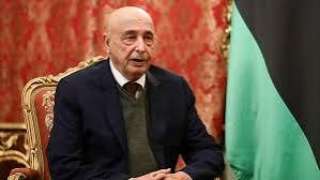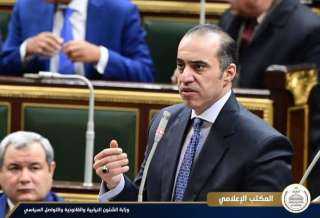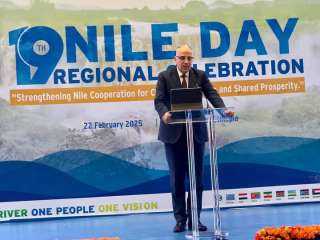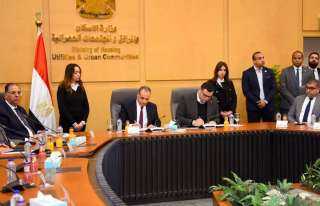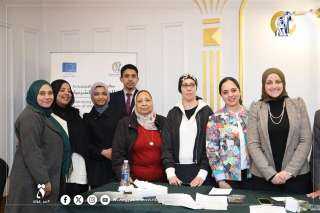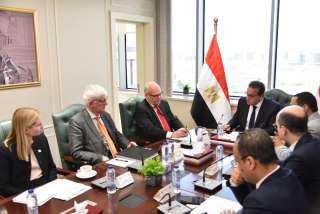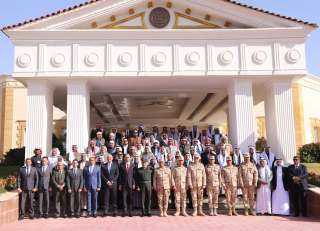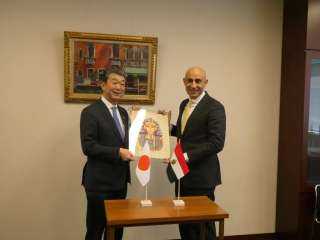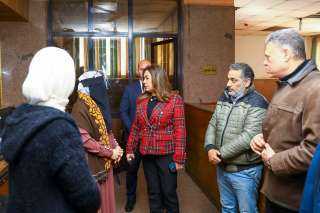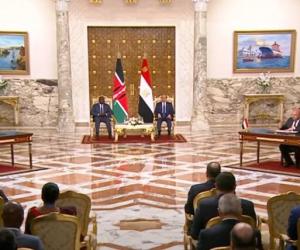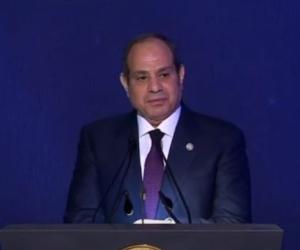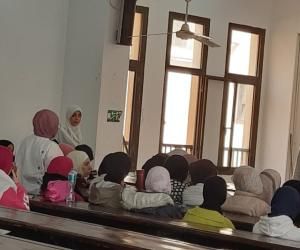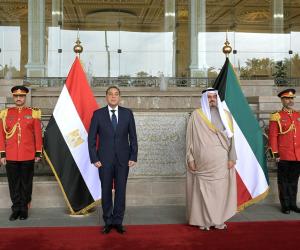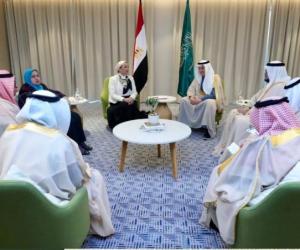سويلم: الإدارة التعاونية لموارد النيل ستسهم في تعزيز مرونة المنطقة أمام التحديات العابرة للحدود وخلق مناخ من الاستقرار والسلام


- التصرفات الأحادية التي تتم تحت زريعة السيادة وتتجاهل الامتثال لقواعد القانون الدولي تعد تحديًا صارخاً للتعاون العابر للحدود فى حوض النيل مثل بناء السد الاثيوبى وملؤه وتشغيله بشكل أحادي
- مصر تحترم حق جميع الدول المتشاطئة في التنمية وتساهم بفعالية في دعم نموها وتَقدمها وفي المقابل، تطالب مصر بضمان احترام وحماية حقها الأساسي في الحياة وسبل العيش
- مصر تؤكد إلتزامها الكامل بتنفيذ القرار الذى تم إتخاذه خلال الاجتماع الوزاري الأخير بشأن إطلاق العملية التشاورية ، وندعو شركاء التنمية لدعم العملية التشاورية الجارية
- قيام مصر بإنشاء آلية تمويل لدعم مشروعات المياه المتفق عليها على المستويين الوطني والعابر للحدود في دول الحوض
- أشيد بقرار فخامة الرئيس يوري موسيفيني، رئيس دولة أوغندا، بتأجيل القمة الثانية لرؤساء دول وحكومات حوض النيل لمنح مزيد من الوقت للمشاورات واستعادة التوافق بين دول الحوض
شارك السيد الأستاذ الدكتور/ هاني سويلم وزير الموارد المائية والري، في حدث "يوم النيل" الذى أقيم في ٢٢ فبراير ٢٠٢٥، بمناسبة مرور تسعة عشر عامًا على تأسيس مبادرة حوض النيل، وذلك بمشاركة وزراء المياه من جنوب السودان وإثيوبيا وكينيا، إلى جانب سفراء رواندا وبوروندي وتنزانيا، وممثلي كل من السودان والكونغو وأوغندا.
وخلال كلمته الافتتاحية، أكد الدكتور هاني سويلم أهمية هذه المناسبة التي تجمع دول الحوض لإعادة تأكيد التزامها المشترك بتعزيز التعاون الإقليمي، وهو ما تجسد منذ عام ١٩٩٩ بتأسيس مبادرة حوض النيل، المنصة التعاونية - الأولى والوحيدة - الشاملة التي تضم كافة دول الحوض، وتسعى لتحقيق رؤية قائمة على التعاون، والازدهار المتبادل، والتنمية المستدامة.
وأوضح سيادته أن شعار حدث هذا العام "تعزيز التعاون في حوض النيل من أجل التكيف مع المناخ والازدهار المشترك" يعكس الحاجة الملحة لتوحيد الجهود، مشددًا على أن التعاون المشترك هو السبيل الأمثل لمواجهة التحديات المرتبطة بالمياه، بما في ذلك التأثيرات الكبيرة لتغير المناخ مثل الجفاف الممتد، الفيضانات المدمرة، والتغيرات في أنماط هطول الأمطار، كما أكد أن الإدارة التعاونية لموارد النيل ستسهم في تعزيز مرونة المنطقة أمام التحديات العابرة للحدود وخلق مناخ من الاستقرار والسلام.
وأشار الوزير إلى العلاقات التاريخية التي تربط مصر بدول الحوض في مجالات التجارة والتبادل الثقافي والابتكار العلمي والدبلوماسية، مؤكدًا أن مصر كانت من أوائل الدول الداعمة لمبادرة حوض النيل ماليًا وفنيًا وسياسيًا، مما ساهم في جعل المبادرة مؤسسة قوية تُعد اليوم حجر الزاوية للتعاون في حوض نهر النيل، وعلى الرغم من ذلك اضطرت مصر في عام ٢٠١٠ إلى تجميد مشاركتها في الأنشطة الفنية للمبادرة بسبب حيادها عن المبادئ التعاونية التوافقية التي تأسست عليها، وتحديدًا مبدأ التوافق وهو ما نتج عنه وثيقة غير متوازنة تشجع على الاجراءات الأحادية وتتجاهل المصالح الأساسية لدول المصب في خرق واضح لروح التعاون.
كما أشار سيادته الى ان التصرفات الأحادية التي تتم تحت زريعة السيادة وتتجاهل الامتثال لقواعد القانون الدولي تعد تحديًا صارخاً للتعاون العابر للحدود فى حوض النيل، وخاصة مصر التي تعد من أكثر الدول جفافاً على مستوى العالم كما أنها تعتمد بشكل شبه كامل على مياه النيل من أجل بقائها، أو قد يتم ذلك من خلال تطبيق القانون الدولى بشكل انتقائي وخاصةً حين يتم تجاهل المبدأ الأساسي للتعاون، والذي يلزم الدول بالتشاور وإجراء دراسات تقييم الأثر الاجتماعي والاقتصادي والبيئي على التدابير المخطط لها بهدف ضمان الاستخدام العادل والمعقول وتجنب التسبب في ضرر جسيم، مؤكدا أن أبرز الأمثلة على تلك التصرفات الأحادية هو بناء سد (السد الاثيوبى) وملؤه وتشغيله بشكل أحادي دون إجراء الدراسات اللازمة لتقييم الآثار الاجتماعية والاقتصادية والبيئية ودون وجود اتفاق قانونى ملزم مع الدول المتشاطئة الأخرى بشأن ملء وتشغيل هذا السد، مؤكدا ان مصر تحترم حق جميع الدول المتشاطئة في التنمية وتساهم بفعالية في دعم نموها وتَقدمها وفي المقابل، تطالب مصر بضمان احترام وحماية حقها الأساسي في الحياة وسبل العيش.
وأوضح سيادته ان مصر ترحب دائما وتساند جميع المبادرات التي تهدف إلى استعادة وحدة حوض النيل وتعزيز التعاون الاقليمى، ولذلك تؤكد مصر على إلتزامها الكامل بتنفيذ القرار الذى تم إتخاذه خلال الاجتماع الوزاري الأخير بشأن إطلاق العملية التشاورية التي تضم ثلاث من الدول الستة الموقعة على ما يسمى بالاتفاقية الإطارية، وهي أوغندا ورواندا وجنوب السودان، بالإضافة إلى الأربع دول التي لم تنضم للاتفاقية وهى جمهورية الكونغو الديمقراطية، ومصر، وكينيا، والسودان، وهو ما يعكس إيماننا الراسخ بالحوار والشراكة كأدوات أساسية لتجاوز التحديات وتشكيل مستقبل مرن ومزدهر، معربا عن تطلعه بأن تثمر هذه العملية إلى استعادة التوافق والشمولية بين دول حوض النيل، مما يٌمكننا من التقدم معًا نحو تحقيق رؤيتنا المشتركة للتعاون الإقليمي والازدهار، كما حث سيادته شركاء التنمية الذين دعموا مبادرة حوض النيل منذ إنشائها على دعم العملية التشاورية الجارية بروح الشمولية والتعاون الإقليمي.
وفى إطار موازى، وتأكيداً على حرص مصر على دعم التنمية بدول الحوض وسعيها لتعزيز التعاون الثنائي والإقليمي مع دول الحوض عبر مختلف قطاعات التنمية، أشار السيد الوزير إلى قيام مصر بإنشاء آلية تمويل موجهة لدعم مشروعات المياه المتفق عليها على المستويين الوطني والعابر للحدود في دول الحوض حيث تم تصميم هذه الآلية التمويلية لتوفير تمويل مبدئي لتعزيز المشروعات الاستثمارية، بما في ذلك تلك المتعلقة بإدارة الموارد المائية، مع الالتزام التام بقواعد القانون الدولي، وقد دعا سيادته دول الحوض إلى الافادة بمشروعاتهم ذات الأولوية، حتى يتسنى لنا العمل معًا تحت هذا الإطار لتحقيق نتائج ملموسة.
كما أشاد الوزير بقرار فخامة الرئيس يوري موسيفيني، رئيس دولة أوغندا، بتأجيل القمة الثانية لرؤساء دول وحكومات حوض النيل لمنح مزيد من الوقت للمشاورات، مما يضمن أن جميع الأطراف لديها الوقت الكافي لمعالجة مخاوفها والمساهمة بشكل هادف في الحوار المستمر وهو الأمر الذى يؤكد على الإلتزام الراسخ برؤيتنا المشتركة لإعادة الشمولية داخل الحوض، مشيراً إلى ثقتنا في أن المناقشات بشأن القمة سوف تستأنف فقط بمجرد الانتهاء من عملية التشاور القائمة.
وفى ختام كلمته، أشار السيد الوزير إلى أن شعار "عدم ترك أحد خلف الركب" ليس مجرد شعاراً في الأجندة العالمية للتنمية المستدامة بل هو مبدأ توجيهي يجب أن ينعكس في الشمولية الحقيقية والتقدم الجماعي، مما يتطلب منا تجاوز خلافاتنا وتحديد الأولويات المشتركة لجميع دول حوض النيل لضمان مستقبل يتميز بالاستقرار، والتعاون، والازدهار المشترك، ولذلك فإن الالتزام الراسخ بالشمولية والتقدم هو الأساس الذي تستند عليه مصر لتحقيق التعاون والسلام والأخوة.
Unofficial translation
Regarding the Participation of His Excellency, the Minister, in the Nile Day event
• H.E. Prof. Dr. Hani Sewilam, Minister of Water Resources and Irrigation, participated in the Nile Day event held on February 22nd to commemorate the 19th anniversary of the founding of the Nile Basin Initiative. This event was attended by water ministers from South Sudan, Ethiopia, and Kenya, as well as the ambassadors of Rwanda, Burundi, and Tanzania, and representatives from Sudan, the Democratic Republic of Congo, and Uganda.
• In his remarks, Dr. Hani Sewilam emphasized the significance of this occasion, which brings together all Nile Basin countries to reaffirm their joint commitment to strengthening regional cooperation across the Nile Basin. This day serves as a tribute to the establishment of the Nile Basin Initiative (NBI) in 1999, the first and only comprehensive cooperative platform encompassing all Nile Basin states in pursuit of a shared vision anchored in cooperation, mutual prosperity, and sustainable development for the region.
• His Excellency stated that the theme of this year's event, "Strengthening Nile Cooperation for Climate Resilience and Shared Prosperity," reflects the urgent need to unify efforts among the Nile Basin States. He further stressed that a collaborative approach is essential in addressing the water-related challenges facing the region, particularly the severe impacts of climate change, such as prolonged droughts, devastating floods, and erratic rainfall patterns. Furthermore, he emphasized that the cooperative management of the Nile's resources will play a pivotal role in enhancing the region's resilience against transboundary challenges and fostering a climate of peace and stability.
• The Minister highlighted the deep-rooted historical ties between Egypt and the Nile Basin countries, characterized by cooperation in trade, cultural exchange, scientific innovation, and diplomacy. He underscored that Egypt has been a steadfast proponent of collective action and regional integration, as exemplified by its pivotal role in the founding of the Nile Basin Initiative (NBI) in 1999, and by providing substantial financial, technical, and political support to the NBI, helping to fortify it into the resilient institution that serves as a cornerstone of cooperation today.
• However, in 2010, Egypt was compelled to suspend its participation in the NBI's technical activities due to deviations from the consensual cooperative principles upon which the initiative was founded, specifically the deviation from consensus during the drafting of the Cooperative Framework Agreement (CFA). This, in turn, led to an imbalanced framework that encouraged unilateralism, disregarding the essential interests of downstream nations and undermining the spirit of cooperation.
• His Excellency further emphasized that noncooperative and unilateral actions, under the claim of sovereignty, which ignore compliance with international law, pose major challenges to transboundary cooperation within the Nile Basin, especially for Egypt—one of the most water-scarce countries in the world, which relies almost entirely on the Nile for its survival. This could manifest through the selective application of international law, particularly when the fundamental principle of cooperation is disregarded. This principle necessitates consultation and conducting socio-economic and environmental impact assessments on planned measures to ensure equitable and reasonable utilization and to avoid inflicting significant harm. A case in point is the unilateral construction, filling, and operation of a dam (the Ethiopian dam) in the absence of the necessary socio-economic and environmental impact studies and in the absence of a legally binding agreement with the other riparian countries governing its filling and operation. Egypt not only respects the right of all other riparian countries to development but also actively supports their growth and progress. In return, Egypt simply seeks to have its own fundamental right to life and livelihood considered and protected.
• This commitment is demonstrated by Egypt's consistent support for all initiatives aimed at restoring Nile Basin unity and strengthening collaboration. In this context, Egypt reaffirms its commitment to the recent decision of the Nile Council of Ministers (Nile-COM) to launch a consultation process that involves three of the six parties to the CFA, namely Uganda, Rwanda, and South Sudan, along with the four countries that have not joined the agreement—Democratic Republic of Congo, Egypt, Kenya, and Sudan. This commitment reflects Egypt’s steadfast belief in dialogue and partnership as indispensable instruments for overcoming challenges and shaping a resilient and prosperous future.
• Egypt remains committed to welcoming and supporting all initiatives that aim to restore the unity of the Nile Basin and enhance regional cooperation. It is our sincere hope that this process will lead to the full and inclusive participation of all ten Nile Basin states, enabling us to collectively advance our shared vision for regional cooperation and prosperity. Moving forward, we urge our esteemed development partners—who have consistently supported the Nile Basin Initiative since its inception—to continue their invaluable support for the ongoing consultative process in the spirit of inclusivity and regional cooperation.
• In the same vein, and as part of Egypt’s unwavering commitment to supporting the Nile Basin countries in their developmental endeavours, as well as fostering bilateral and regional cooperation across diverse development sectors, the Minister highlighted Egypt's establishment of a dedicated financing mechanism to support agreed water-related projects at both the national and transboundary levels within the Nile Basin countries. This financing mechanism is designed to provide seed funding to promote investment projects, including those related to water resources management, in full conformity with international law. He called upon Nile Basin countries to submit their project priorities so that Egypt can work collaboratively with them under this framework to achieve tangible results.
• The Minister also praised the wise decision taken by H.E. President Yoweri Museveni of Uganda to postpone the second Nile Basin Summit of Heads of State and Government, allowing more time for consultations among member states. This decision ensures that all parties have adequate time to address their concerns and contribute meaningfully to the ongoing dialogue, reaffirming the steadfast commitment to the shared vision of restoring inclusivity within the basin. He expressed confidence that discussions regarding the summit will resume only after the consultative process has been successfully concluded.
• In conclusion, the Minister emphasized that “Leaving No One Behind” is not merely a slogan of the global sustainable development agenda but a guiding principle that should be reflected in genuine inclusivity and collective progress. This necessitates overcoming our differences and prioritizing the shared interests of all Nile Basin states, ensuring a future marked by stability, cooperation, and shared prosperity. Accordingly, Egypt’s steadfast commitment to inclusivity and progress serves as the foundation for its pursuit of cooperation, peace, and fraternity.





